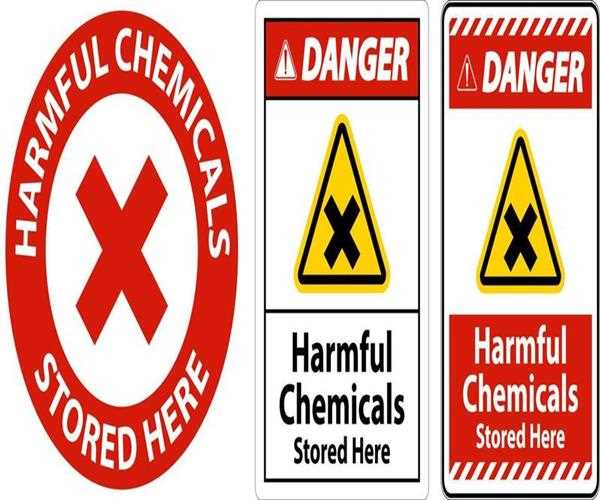
21-Apr-2023 , Updated on 4/26/2023 9:55:47 PM
Importance of harmful chemicals in day to day life and how to escape from it
The impact of harmful chemicals in day-to-day life cannot be ignored. From the food we eat to the air we breathe, chemicals are everywhere. Some of these chemicals are harmless, while others can have a negative impact on our health and well-being. In this article, we will explore the impact of harmful chemicals in day-to-day life and how to escape from their harmful effects.
What are Harmful Chemicals?
Harmful chemicals are substances that can cause harm to human health or the environment. These chemicals can be found in various products, such as food, cleaning products, cosmetics, and pesticides. Some of the most common harmful chemicals include:
Pesticides: Pesticides are chemicals used to control pests, such as insects, rodents, and weeds. These chemicals can be harmful to humans and can cause health problems, such as cancer, reproductive issues, and neurological problems. Pest control activities can be essential.
Heavy Metals: Heavy metals, such as lead, mercury, and cadmium, can accumulate in the body over time and cause a range of health problems, including neurological and developmental problems, kidney damage, and cancer.
Phthalates: Phthalates are a group of chemicals used to soften and increase the flexibility of plastics. These chemicals can be found in a range of products, including food packaging, cosmetics, and toys. Phthalates have been linked to reproductive problems, developmental issues, and hormonal imbalances.
Bisphenol A (BPA): BPA is a chemical used to make plastics, and it can be found in food packaging, water bottles, and other products. BPA has been linked to a range of health problems, including cancer, reproductive issues, and developmental problems.
Impact of Harmful Chemicals
The impact of harmful chemicals on our health and the environment can be significant. Exposure to these chemicals can lead to a range of health problems, including:
Cancer: Exposure to certain chemicals, such as pesticides and heavy metals, can increase the risk of cancer.
Reproductive Problems: Harmful chemicals can affect reproductive health in both men and women. Exposure to phthalates and BPA, for example, can lead to infertility, reduced sperm count, and other reproductive issues.
Neurological Problems: Exposure to certain chemicals, such as lead and mercury, can cause neurological problems, including cognitive impairment, memory loss, and developmental delays in children.
Allergic Reactions: Some chemicals can cause allergic reactions, including skin rashes, respiratory problems, and other symptoms.
How to Escape from the Harmful Effects of Chemicals
Choose Organic Food: One of the best ways to avoid harmful chemicals in your diet is to choose organic food. Organic food is grown without the use of synthetic pesticides, fertilizers, or other chemicals, making it a healthier option.
Use Natural Cleaning Products: Many cleaning products contain harmful chemicals that can be harmful to your health and the environment. Instead, choose natural cleaning products that are free from harmful chemicals.
Avoid Plastics: Plastics contain harmful chemicals, such as BPA and phthalates, which can leach into your food and water. Instead, choose glass or stainless steel containers for food and water storage.
Use Natural Cosmetics: Cosmetics can contain a range of harmful chemicals, including parabens, phthalates, and synthetic fragrances. Instead, choose natural cosmetics that are free from harmful chemicals.
Check Labels: Always check the labels of products you buy and choose those that are free from harmful chemicals.
Air Out Your Home: Many household products, such as paints, cleaners, and carpets, can release harmful chemicals into the air. To reduce your exposure, air out your home by opening windows and using air purifiers.
Test Your Home for Lead: Homes built before 1978 may contain lead paint, which can be harmful, especially to young children. Get your home tested for lead and take steps to remove any lead paint if it is present.
Use a Water Filter: Water can contain harmful chemicals, such as chlorine, fluoride, and heavy metals. Use a water filter to remove these chemicals and ensure that you are drinking clean, safe water.
Choose Natural Pest Control Methods: Instead of using harmful pesticides, choose natural pest control methods, such as traps and natural repellents.
Avoid Smoking and Second-Hand Smoke: Smoking and second-hand smoke can expose you to harmful chemicals, such as carbon monoxide, nicotine, and tar. Avoid smoking and second-hand smoke to reduce your exposure to these chemicals.
Harmful chemicals are all around us, and it is important to take steps to reduce our exposure to them. The impact of these chemicals on our health and the environment can be significant, and it is up to us to take action to protect ourselves and our families. By choosing organic food, using natural cleaning products and cosmetics, avoiding plastics, and checking labels, we can reduce our exposure to harmful chemicals. Additionally, by testing our homes for lead, using water filters, and choosing natural pest control methods, we can further reduce our exposure to harmful chemicals. With these steps, we can escape from the harmful effects of chemicals and live healthier, safer lives.

SEO and Content Writer
I am Drishan vig. I used to write blogs, articles, and stories in a way that entices the audience. I assure you that consistency, style, and tone must be met while writing the content. Working with the clients like bfc, varthana, ITC hotels, indusind, mumpa, mollydolly etc. has made me realized that writing content is not enough but doing seo is the first thing for it.
Comments
Join Our Newsletter
Subscribe to our newsletter to receive emails about new views posts, releases and updates.
Copyright 2010 - 2026 MindStick Software Pvt. Ltd. All Rights Reserved Privacy Policy | Terms & Conditions | Cookie Policy